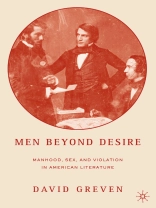This book explores the construction of male sexuality in nineteenth-century American literature and comes up with some startling findings. Far from desiring heterosexual sex and wishing to bond with other men through fraternity, the male protagonists of classic American literature mainly want to be left alone. Greven makes the claim that American men, eschewing both marriage and male friendship, strive to remain emotionally and sexually inviolate. Examining the work of traditional authors – Hawthorne, Poe, Melville, Cooper, Irving, Stowe – Greven discovers highly untraditional and transgressive representations of desire and sexuality. Objects of desire from both women and other men, the inviolate males discussed in this study overturn established gendered and sexual categories, just as this study overturns archetypal assumptions about American manhood and American literature.
表中的内容
Republican Machines Troubling Our Heads About Ichabod Fear of Fanshawe Disturbing the Sleep of Bachelors Madman! Poe Bound in Black Morocco Afterlife… The Angel Must Hang Coda
关于作者
David Greven is Associate Professor of English at the University of South Carolina, USA. His books include Psycho-Sexual: Male Desire in Hitchcock, De Palma, Scorsese and Friedkin; The Fragility of Manhood: Hawthorne, Freud, and the Politics of Gender ; and Men Beyond Desire: Manhood, Sex, and Violation in American Literature . Greven’s essays on film have been published in journals such as the Quarterly Review of Film and Video, Cinema Journal, Genders, Jump Cut, Cine Action , and Cineaste and he is on the editorial boards of Cinema Journal, Genders, and Poe Studies .












